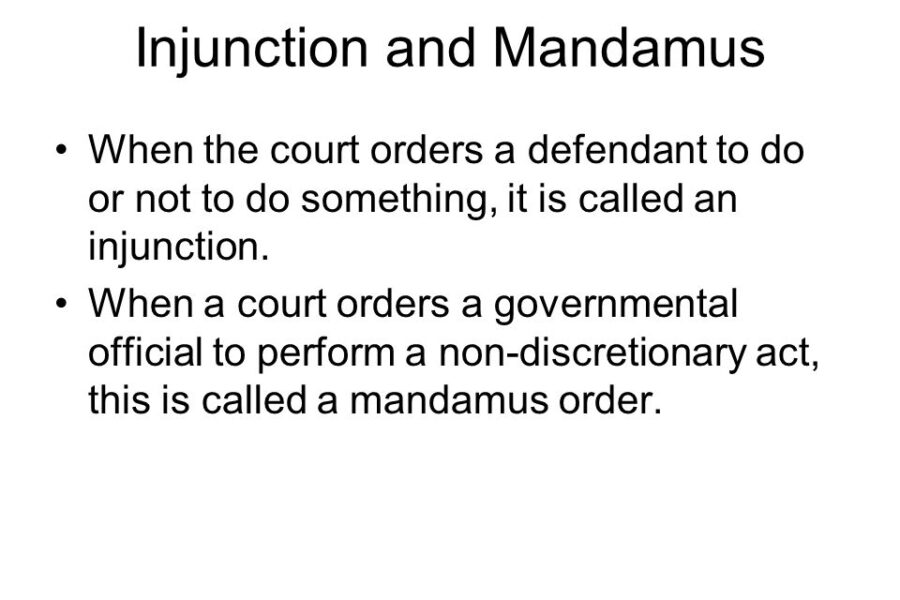In the realm of legal remedies, injunctions and mandamus are two distinct but powerful tools that courts may employ to uphold justice and protect rights. While both serve as means of judicial intervention, they operate in different contexts and serve different purposes. This article aims to explore the fundamental differences between injunctions and mandamus, elucidating their respective characteristics, applications, and jurisprudential significance. Through comparative analysis and examination of relevant case law, this article seeks to provide clarity on the nuanced distinctions between these two equitable remedies.
Understanding Injunction:
An injunction is a judicial order that prohibits or restrains a party from engaging in certain conduct or activities. It is a preventive remedy sought by a plaintiff to prevent harm, preserve rights, or maintain the status quo. Injunctions may be temporary (interlocutory) or permanent, depending on the circumstances of the case. The grant of an injunction is discretionary and is typically based on the principles of equity and fairness.
Key features of injunctions include:
- Prima Facie Case: The plaintiff seeking an injunction must demonstrate a prima facie case, showing a likelihood of success on the merits of the underlying legal claim.
- Irreparable Harm: The plaintiff must establish that the harm or injury likely to be suffered cannot be adequately compensated through monetary damages alone, rendering injunctive relief necessary to prevent irreparable harm.
- Balance of Equities: Courts weigh the interests of the parties and consider the balance of equities in deciding whether to grant an injunction. This involves assessing the relative harm to the parties and the public interest.
- Discretion of the Court: The grant or denial of an injunction is within the discretion of the court, which considers the specific facts and circumstances of each case.
Illustrative Case: Ramji Lal Modi v. State of Uttar Pradesh (1957)
In the landmark case of Ramji Lal Modi v. State of Uttar Pradesh, the Supreme Court of India elucidated the principles governing the grant of injunctions. The court held that an injunction is an equitable remedy aimed at preventing a threatened injury or enforcing a right, and its grant depends on the balance of convenience and the likelihood of irreparable harm.
Understanding Mandamus:
Mandamus is a prerogative writ issued by a court to compel a public official or body to perform a statutory duty, exercise a discretionary power, or correct an abuse of discretion. Unlike injunctions, which focus on preventing harm, mandamus is directed towards enforcing positive action or compelling the performance of a legal duty. Mandamus is considered an extraordinary remedy and is granted in exceptional circumstances where there is a clear legal right and a corresponding duty owed by the respondent.
Key features of mandamus include:
- Legal Duty: The petitioner seeking mandamus must demonstrate a clear legal right to the relief sought and establish that the respondent has a corresponding legal duty to perform the act in question.
- Ministerial Act: Mandamus is typically issued to compel the performance of a ministerial act rather than a discretionary act. It is not available to control or interfere with the exercise of discretion by public authorities.
- Absence of Alternative Remedy: Mandamus may be granted when there is no other adequate remedy available to the petitioner, and the failure to act would result in a miscarriage of justice.
- Public Interest: Courts consider the public interest and the broader implications of the requested relief in deciding whether to grant mandamus.
Illustrative Case: State of West Bengal v. Administrator, Howrah Municipality (1972)
In State of West Bengal v. Administrator, Howrah Municipality, the Calcutta High Court addressed the scope and applicability of mandamus in the context of public administration. The court emphasized that mandamus is a remedy available to compel the performance of a public duty or the exercise of a public power, and it is not intended to substitute the discretion of public authorities.
Comparative Analysis:
While injunctions and mandamus are both equitable remedies aimed at achieving justice, they serve distinct purposes and operate within different legal frameworks. Injunctions focus on preventing harm and preserving rights by restraining certain conduct, whereas mandamus is concerned with enforcing positive action and compelling the performance of legal duties.
Injunctions are typically sought in civil matters where there is a risk of irreparable harm or injury, and the plaintiff seeks to maintain the status quo or prevent the violation of rights. On the other hand, mandamus is invoked in administrative law contexts to ensure compliance with statutory duties and prevent the abuse of power by public authorities.
Moreover, the grant of injunctions is discretionary and depends on a careful balancing of the equities, whereas mandamus is issued as a matter of right when the petitioner establishes a clear legal entitlement to relief and a corresponding duty owed by the respondent.
Conclusion:
In conclusion, injunctions and mandamus are two important equitable remedies that play distinct roles in the administration of justice. While injunctions focus on preventing harm and preserving rights through prohibitory orders, mandamus is directed towards enforcing positive action and compelling the performance of legal duties. Understanding the differences between these remedies is essential for litigants, lawyers, and judges alike, as they navigate the complex terrain of legal disputes and administrative law challenges. Through a nuanced analysis and application of these remedies, courts can uphold the rule of law, protect individual rights, and ensure the effective functioning of the justice system.
Adv. Khanak Sharma


Drug information.
how can i get generic lisinopril pill
The staff always remembers my name; it feels personal.
Been a loyal customer for years and they’ve never let me down.
buying cheap clomid no prescription
They have a great selection of wellness products.
The epitome of excellence in international healthcare.
lisinopril change to losartan
The staff ensures a seamless experience every time.
Always up-to-date with the latest healthcare trends.
where to buy generic clomid pill
Their international insights have benefited me greatly.